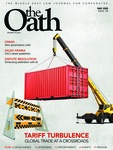News from the DIFC

The University of Dubai and the DIFC Academy of Law announced details of a partnership to support the on-going growth and development of the UAE legal profession. The two organisations will cooperate on initiatives that enhance the skills and knowledge of the country’s lawyers and law students, including research, training programmes and the hosting of legal seminars and conferences.
The Memorandum of Understanding (MoU) was signed at the University of Dubai following a talk to College of Law students, as well as invited guests from the UAE legal community. Speakers included H.E. Dr. Eesa Al Bastaki, President of the University of Dubai (UD), Michael Hwang, DIFC Courts Chief Justice and Head of the Dispute Resolution Authority, Dr. Harold Koster, Director of the University of Dubai College of Law, and David Gallo, Director of the Academy of Law.
H.E. Dr. Eesa Al Bastaki said that UD is committed to quality in education and our MOU with the DIFC Academy of Law is a clear example of that commitment to always work with high standard and quality institution like DIFC Dispute Resolution Authority. He added that despite all changes taking place around the globe, education is still needed to advance all aspects of life in the country. The College of Law was established by the University of Dubai in 2013 to respond to the increasing demand for legal professionals in the UAE. It offers a Master of Laws (LLM) programme with two tracks: Arbitration & Dispute Resolution, and Financial Crimes & Money Laundering, with admission open to both Law and non-Law graduates.

The Dubai Investment Development Agency (Dubai FDI), an agency of the Department of Economic Development (DED) in Dubai, has signed a Memorandum of Understanding (MoU) with the DIFC Dispute Resolution Authority (DRA) to support the emirate’s economic ambitions outlined in Dubai Plan 2021. The document was signed by Fahad Al Gergawi, chief executive officer of Dubai FDI, and Michael Hwang, SC, head of the Dispute Resolution Authority and chief justice of the DIFC Courts. The MoU focuses on promoting Dubai as a centre of legal excellence that offers certainty to global investors and businesses operating in the emirate. “A globally trusted dispute resolution mechanism is integral to investor confidence in Dubai. We are delighted to have DIFC Dispute Resolution Authority as our partners as it enhances our combined efforts and Dubai FDI’s message to investors worldwide that Dubai has the best systems to sustain and grow their investment,” commented Fahad Al Gergawi.
The DIFC Dispute Resolution Authority (DRA) was established in 2014 as a platform for delivering legal excellence in the Middle East and as the gateway to a suite of services available to businesses operating in Dubai. Its divisions, which include the DIFC Courts, DIFC Wills and Probate Registry and Academy of Law, work in partnership to provide businesses with unparalleled choice about how to resolve their commercial disputes, to develop legal talent and to protect individuals investing or living in Dubai. Under the terms of the MoU, the DIFC DRA and Dubai FDI will also collaborate on the exchange of information and research, and the hosting of joint conferences and exhibitions.

The DIFC Courts’ standing as an international centre of legal excellence continues to be mirrored by a surge in the value of cases filed, according to figures released last month. The first nine months of 2015 witnessed a five-fold increase in the total value of claims filed with Dubai’s established English-language, commercial common law judicial system, from AED1.1 billion to AED5.3 billion, a higher aggregate value than all claims filed in 2013 and 2014 combined. The increase reflects the increasing size and complexity of cases handled by the DIFC Courts, rather than an increase in the amount of litigation. The total number of cases filed with the Court of First Instance (CFI) in the first nine months of 2015 fell slightly, while the average value per claim has more the doubled, from AED40.3 million to AED95.7 million. Of the cases heard by the CFI so far in 2015, almost all were international disputes. Importantly, settlement rates remain extremely high at 92 percent, in part because of an innovative fee structure introduced earlier in 2015 which incentivises parties to settle early by rebating court fees. The total and average values of cases heard by the Small Claims Tribunal (SCT) also increased following the extension of its default jurisdiction to cover all claims up to AED500,000 in value, regardless of the nature of the case. The extension has benefitted businesses by offering cheaper, faster and confidential access to justice, with the emphasis at SCT hearings on amicable dispute resolution, with parties usually not represented by lawyers. The total value of SCT cases heard in the first nine months of 2015 quadrupled from AED3.7 million to AED 14.6 million, while the average claim value increased by 43% to AED 82,000. Despite the SCT’s increasing workload, over 90 percent of cases are still resolved within four weeks of the case commencing.

























































































































